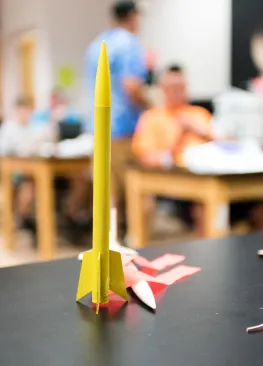What Can You Do With A Planetary Science Degree?
Marietta College’s Planetary Science major is ideal for students interested in careers with NASA or other space exploration agencies or who are curious about the origins and evolution of our solar systems and its planets, life, and all other matter.
Space exploration may sound like the stuff of science fiction, but for planetary scientists, it’s real and it’s happening right now.
One of the last astronauts to step foot on the Moon — Harrison “Jack” Schmitt — was a geologist and planetary scientist. Likewise, the first astronauts on Mars will be trained geologists. If you want to be at the forefront of NASA and space exploration, this major is for you!




What You’ll Learn as a Planetary Science Major
Planetary Science is the study of the formation and evolution of celestial bodies across the universe, with a strong focus on our solar system.
Interdisciplinary Learning
While historically, Planetary Science fell within the realm of Physics/Astronomy, advancements in planetary exploration, such as the NASA Apollo and Mars rover programs, have brought these bodies to our labs and to our robotic fingertips, ushering in the importance of geological sciences to the field. Thus, Planetary Science is inherently interdisciplinary, involving studies in both Physics and Geology. This makes Marietta College, where interdisciplinary education is a core value and strongly supported, an ideal location to pursue a Planetary Science degree
Experiential Learning
Students take a comparable number of in-depth courses and labs in Physics and Geology, and gain experiential learning through laboratory analyses, planetarium use, geology field trips, geology field camp — a five-week expedition to the Rocky Mountains — and other opportunities. Students who want to earn advanced degrees in Planetary Science will possess a background in both Physics and Geology that will best prepare them for graduate-level success.
More Info
There are many internship opportunities for students in the major. Marietta’s involvement with the Ohio Space Grant Consortium provides opportunities at many of the NASA institutions throughout the country — including the Johnson Space Center and the Jet Propulsion Laboratory. Marietta College also has connections with other NASA-affiliated laboratories (e.g. Johns Hopkins Applied Physics Laboratory) and NASA space exploration missions to Mars, asteroids,, and other planetary bodies.
- Where do planetary scientists work?
- NASA
- U.S. Geological Society
- Jet Propulsion Laboratory
- Applied Physics Laboratory
- European Space Agency
- Japanese Aerospace Exploration Agency
- Universities
- SpaceX
- Private space exploration institutions
- Honor Societies and Student Organizations
Because Planetary Science is an interdisciplinary field, majors are at home interacting within various academic clubs and organizations, such as MC(2), which is Marietta’s Math and Physics student organization, the Geology Club, the Chemistry Club, and other science-related student groups. Majors are also encouraged to volunteer during special STEAM camps for local school children to help foster their love of science and mathematics.







